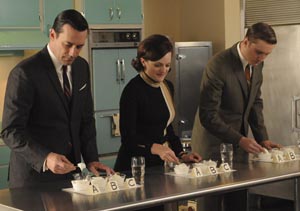 The past is always precedent for the future, and as much as we think we can escape it, as much as we think that we will be the exception from the time-worn formula for aging, as much as we think that somehow we’ll beat the system and attain our goals and live our dreams and know all about the hip music when we’re 40, it’s just never going to happen. We’re destined to be the same, old, unhappy people that have taken the train to the suburbs before us. At least that’s what Mad Men wants us to believe.
The past is always precedent for the future, and as much as we think we can escape it, as much as we think that we will be the exception from the time-worn formula for aging, as much as we think that somehow we’ll beat the system and attain our goals and live our dreams and know all about the hip music when we’re 40, it’s just never going to happen. We’re destined to be the same, old, unhappy people that have taken the train to the suburbs before us. At least that’s what Mad Men wants us to believe.
Last night we were greeted with two remarkably different but parallel stories, one about Megan finally quitting Sterling Cooper Draper Price (much like Joan, I thought she would fail there) and one about Pete Campbell having an awful, creepy affair with Beth (played by Alexis Bledel, who will always be most widely known for her groundbreaking work in Sisterhood of the Traveling Pants 2), the wife of a fellow straphanger.
The episode links Pete’s and Megan’s stories together initially with intrigue. Megan gets a phone call for some man who is looking to speak with Megan Calvert, her maiden name, and she sneaks out to use the phone at the phone booth (which we’ll see Pete do later in the episode). Later she sneaks out of working with Peggy, telling her she has to go to dinner with Don. Don calls later looking for her, and Peggy knows that something is up and wants to avoid Don’s further phone calls by screaming “Pizza House” into the receiver using a strange Asian accent. Pete arrives at the train station to find Beth waiting for her husband, Howard, but Pete knows that he’s probably off sleeping with his hot new “piece” in the city. He dutifully covers for his friend, but we know as soon as she convinces Pete to drive her home that he is going to sleep with her.
Megan and Beth are connected in many ways, like their having snacks before bedtime, but the are also opposites. Megan is a “modern wife,” who loves the city and her gay friends and following her dreams. She has a job and an chic modern apartment in the city. Beth, meanwhile, is a “traditional wife,” and she waits for her man to get home and worries about hobos in the city and is strangely confined. She does not have a job and has a boring old house in the suburbs. As far as Matthew Weiner is concerned, only one of these women can be happy and it is the urban wife. Megan is modern and so she feels empowered to chase her dreams to become an actress whereas Beth is stuck at home in a loveless marriage that she resents. Her dreams are stifled and the only expression that can lead to her empowerment or happiness is sexual.
Megan is not only supported by her husband in her current job, but she’s also supported in following her ambition to become an actress. Beth is not supported by her husband at all, who sees her as an object waiting for her at home. She is an object to be used and appeased, not an actual person who is his equal. She is just like Betty Draper, depressed, despondent, and trapped in a role she does not want.
The episode is titled “Lady Lazarus,” probably after the Sylvia Plath poem about a woman killing herself. The popular narrative is that Plath, the perpetual tragic figure of poetry, eventually committed suicide because she was unhappy being just a wife and mother and wanted the life of a poet and artist that wasn’t available to her at the time because of women’s limited role in society. (That she was plagued with life-long crippling depression probably didn’t help either.) That is how we are supposed to see Beth, a woman who is trapped in her house and wanting more. She wants love, mostly. She lures Pete into her honeytrap and gets him to drive her home and then makes herself very available to him. Then she spurns all his subsequent advances to establish a relationship. She doesn’t want Pete, she wants revenge on her philandering husband, she wants excitement, she wants something to take her out of her days of station wagons and frilly aprons.
The last glimpse we get of Beth, she is her staring out the car window not at Pete, but in Pete’s direction. She knows he’s there but won’t make eye contact. She draws a heart in the moisture accumulated on the inside of the car window. The she rolls down the window to erase it. She’s not really sending Pete a message necessarily. Rather she’s putting her need for love out into the world. She’s exhibiting an unbridled and undirected longing for something other than and better than what she has with Howard. If she’s going to be a traditional wife, she at least wants to be one who is loved. But she doesn’t even have that and doesn’t know how to get it. She erases her love like she erases her hope, tamped down into a sad depression that will continue to manifest itself in unpredictable behavior, forever the victim of the role that she has been forced to play.
Next:


